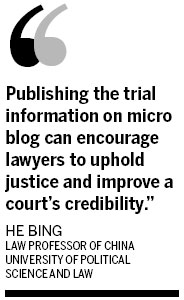Dispute rages over trial by weibo
Updated: 2012-02-23 08:06
By Cao Yin (China Daily)
|
||||||||

BEIJING -A court case in Guizhou province has sparked a heated discussion over whether trial proceedings should be aired on micro blog.
Last month, a gang-related case involving 57 defendants and more than 40 lawyers began in the Xiaohe People's Court in the provincial capital Guiyang. But a dispute between lawyers and judges in the trial has caught the public's attention rather than the case itself.
During the hearing, several lawyers queried jurisdiction and procedures, causing disruption to the point where the judge in one instance ordered three lawyers from the court.
But more controversially, some lawyers in the court have been broadcasting information about the trial and their opinions of the judge through the Sina Weibo website.
He Bing, a law professor from China University of Political Science and Law, said he thought disclosing trial information through micro blog should not be seen as breaching laws but as a good way of monitoring justice.
"The case in Guiyang was open to the public, so lawyers have the right to speak their opinions," he said, adding there was no specific law banning this.
"Publishing the trial information on micro blog can encourage lawyers to uphold justice and improve a court's credibility," he said.
But other lawyers disagreed with He when he too aired his views on weibo.
Wang Yong, a lawyer specializing in criminal cases in Beijing's Chaoyang district, said that lawyers commenting live on a trial on micro blog is unreasonable, and breaches court rules.
"Everyone in the court must abide by the rules. There is no exception for lawyers," Wang said, adding that the responsibility of defendants' lawyers was to devote themselves to the case, not to disclose matters through micro blogs.
Rules state that participants in a court hearing cannot speak unless they receive the judge's permission, and Wang argues this ruling should also apply to the posting of messages on micro blogs during hearings.
"If the lawyers have different ideas about the case or the procedures, they can query them after the trial," he said.
Zhou Liwen, a prosecutor in Central China's Hunan province, posted a micro blog, which has been forwarded almost 2,000 times, saying that participants in the Guiyang trial had behaved irrationally.
"Both the judge and the lawyers lost control and didn't do what they should have done. A trial should be a sensible contest between plaintiffs and defendants, not an argument between attorneys and judges," Zhou said, suggesting that any disagreement should be dealt with before or after the trial.
Zhou thought the micro blogging during the trial might not have been illegal, but would have breached court rules.
"Micro blog, as a form of new media, should also abide by the rules. We can't extend our rights, even though there are no specific laws against doing so," he added.
Since the dispute, the Guiyang court has blocked the mobile phone signal to prevent any recurrence. The trial continues.
China Daily
(China Daily 02/23/2012 page5)

 Relief reaches isolated village
Relief reaches isolated village
 Rainfall poses new threats to quake-hit region
Rainfall poses new threats to quake-hit region
 Funerals begin for Boston bombing victims
Funerals begin for Boston bombing victims
 Quake takeaway from China's Air Force
Quake takeaway from China's Air Force
 Obama celebrates young inventors at science fair
Obama celebrates young inventors at science fair
 Earth Day marked around the world
Earth Day marked around the world
 Volunteer team helping students find sense of normalcy
Volunteer team helping students find sense of normalcy
 Ethnic groups quick to join rescue efforts
Ethnic groups quick to join rescue efforts
Most Viewed
Editor's Picks

|

|

|

|

|

|
Today's Top News
Health new priority for quake zone
Xi meets US top military officer
Japan's boats driven out of Diaoyu
China mulls online shopping legislation
Bird flu death toll rises to 22
Putin appoints new ambassador to China
Japanese ships blocked from Diaoyu Islands
Inspired by Guan, more Chinese pick up golf
US Weekly

|

|






